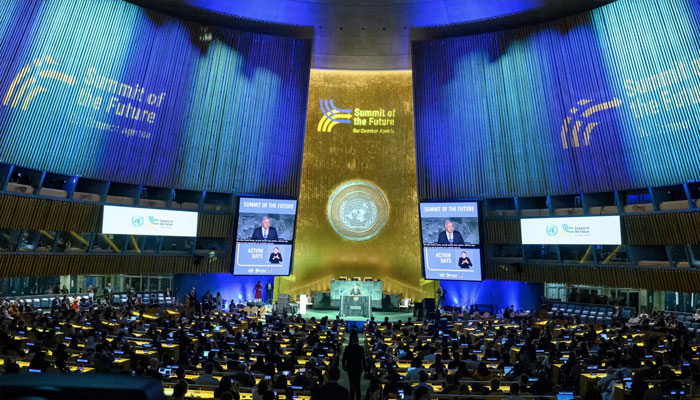Pact for the future
Foremost among these is systemic inequality that remains rooted in international relations and global capitalist economic system
The UN has concluded the ‘Summit of the Future’ (Sep 22-23) during which nations adopted a ‘Pact for the Future’. This ‘pact’ is what one has come to expect of the big, flashy documents that come out of prolonged UN negotiations: there is a lot of promise and almost nothing else. No one is against eradicating poverty and food insecurity, strengthening multilateralism, or any of the ‘pact’s’ other promises, but these goals mean different things to different countries and peoples and thus it is hard to arrive at any kind of concrete plan of action. Take for example subheading ‘g’ under ‘Action 14: We will protect all civilians in armed conflict’, which calls on countries to “Redouble our efforts to end impunity and ensure accountability for violations of international humanitarian law, most serious crimes under international law, including genocide, war crimes, crimes against humanity and other atrocity crimes”. Israel is the elephant in the room when it comes to this section. What happens when one of the most powerful militaries in the world, with the backing of the most powerful country in the world, decides that it will simply ignore the letter of humanitarian law? Beyond what tools and mechanisms are already available, the ones that have already failed, there is little to suggest any extra steps that can be taken to solve the current shortcomings in the international framework.
Much the same can be said for the call for more urgent actions on climate change and enhanced financing for developing countries in light of this problem. Again, despite similar calls being made by the UN in the past, there is as yet little indication that rich countries take their climate duties towards the Global South seriously and will stop dodging them While the rich countries may have signed off on this pact, its proposals are all non-binding, meaning the implementation of these promises will continue to be a challenge. “We are here to bring multilateralism back from the brink”, UN Secretary-General Antonio Guterres told the summit. However, the summit and its resultant pact overlook the deep flaws in the international system that are undermining any serious efforts to promote greater multilateralism. The foremost among these is the systemic inequality that remains rooted in international relations and the global capitalist economic system.
Under this framework, there appears to be simply no way of holding the wealthier and more powerful countries to account and calling on them to take their responsibilities to the rest of the world more seriously. At a time when the needs of developing countries and their people are greater than ever before and the world faces cross-border problems like war and climate change that can only be solved through greater global cooperation and accountability, the flaws in the international system might end up causing a lot more damage before they are actually resolved.
-
 Bad Bunny Faces Major Rumour About Personal Life Ahead Of Super Bowl Performance
Bad Bunny Faces Major Rumour About Personal Life Ahead Of Super Bowl Performance -
 Sarah Ferguson’s Links To Jeffrey Epstein Get More Entangled As Expert Talks Of A Testimony Call
Sarah Ferguson’s Links To Jeffrey Epstein Get More Entangled As Expert Talks Of A Testimony Call -
 France Opens Probe Against Former Minister Lang After Epstein File Dump
France Opens Probe Against Former Minister Lang After Epstein File Dump -
 Last Part Of Lil Jon Statement On Son's Death Melts Hearts, Police Suggest Mental Health Issues
Last Part Of Lil Jon Statement On Son's Death Melts Hearts, Police Suggest Mental Health Issues -
 Leonardo DiCaprio's Girlfriend Vittoria Ceretti Given 'greatest Honor Of Her Life'
Leonardo DiCaprio's Girlfriend Vittoria Ceretti Given 'greatest Honor Of Her Life' -
 Beatrice, Eugenie’s Reaction Comes Out After Epstein Files Expose Their Personal Lives Even More
Beatrice, Eugenie’s Reaction Comes Out After Epstein Files Expose Their Personal Lives Even More -
 Will Smith Couldn't Make This Dog Part Of His Family: Here's Why
Will Smith Couldn't Make This Dog Part Of His Family: Here's Why -
 Kylie Jenner In Full Nesting Mode With Timothee Chalamet: ‘Pregnancy No Surprise Now’
Kylie Jenner In Full Nesting Mode With Timothee Chalamet: ‘Pregnancy No Surprise Now’ -
 Laura Dern Reflects On Being Rejected Due To Something She Can't Help
Laura Dern Reflects On Being Rejected Due To Something She Can't Help -
 HBO Axed Naomi Watts's 'Game Of Thrones' Sequel For This Reason
HBO Axed Naomi Watts's 'Game Of Thrones' Sequel For This Reason -
 King Charles' Sandringham Estate Gets 'public Safety Message' After Andrew Move
King Charles' Sandringham Estate Gets 'public Safety Message' After Andrew Move -
 Lewis Capaldi Sends Taylor Swift Sweet Message After 'Opalite' Video Role
Lewis Capaldi Sends Taylor Swift Sweet Message After 'Opalite' Video Role -
 Brooklyn Beckham Plunges Victoria, David Beckham Into Marital Woes: ‘They’re Exhausted As It Seeps Into Marriage
Brooklyn Beckham Plunges Victoria, David Beckham Into Marital Woes: ‘They’re Exhausted As It Seeps Into Marriage -
 Sarah Ferguson Joins Andrew In ‘forcing’ Their Daughters Hand: ‘She Can Lose Everything’
Sarah Ferguson Joins Andrew In ‘forcing’ Their Daughters Hand: ‘She Can Lose Everything’ -
 'Bridgerton' Author Reveals If Actors Will Be Recast In Future Seasons
'Bridgerton' Author Reveals If Actors Will Be Recast In Future Seasons -
 50 Cent Super Bowl Ad Goes Viral
50 Cent Super Bowl Ad Goes Viral




